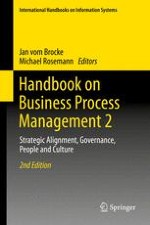2015 | OriginalPaper | Buchkapitel
Expertise in Business Process Management
verfasst von : Alexandra Kokkonen, Wasana Bandara
Erschienen in: Handbook on Business Process Management 2
Verlag: Springer Berlin Heidelberg
Aktivieren Sie unsere intelligente Suche, um passende Fachinhalte oder Patente zu finden.
Wählen Sie Textabschnitte aus um mit Künstlicher Intelligenz passenden Patente zu finden. powered by
Markieren Sie Textabschnitte, um KI-gestützt weitere passende Inhalte zu finden. powered by
